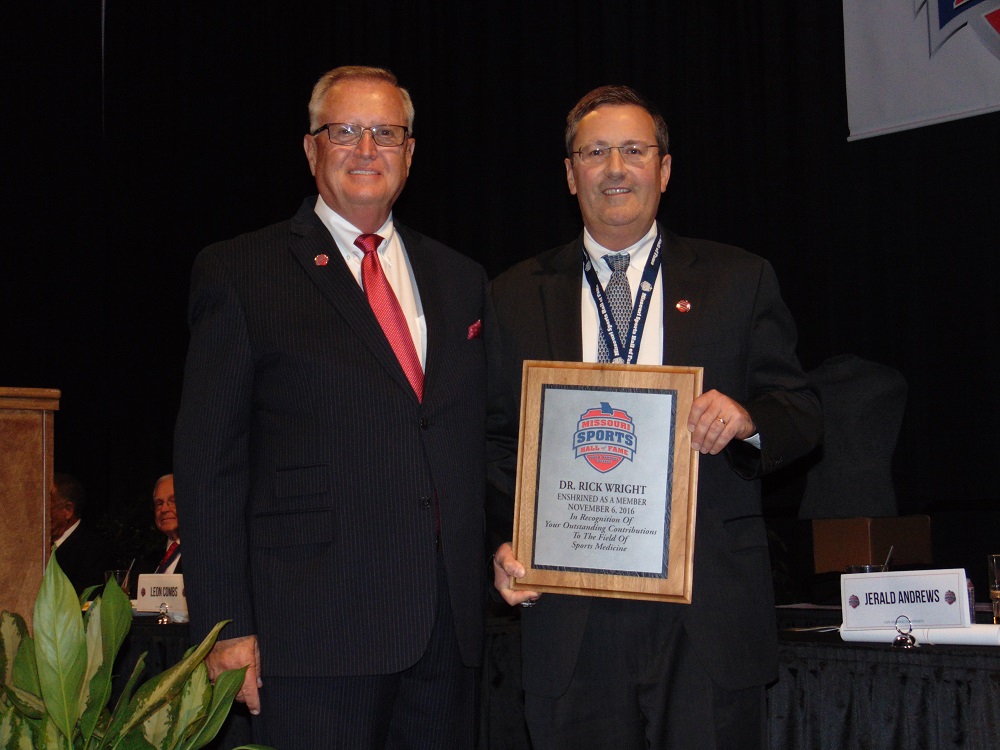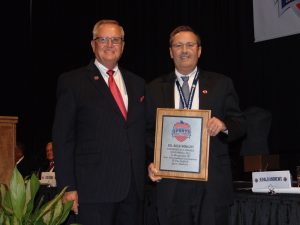Inductees
Dr. Rick Wright


There is one man in the state of Missouri who in the past 20-some years has pulled this trifecta – working as a pro in the National Hockey League, National Football League and Major League Baseball, too.
Yes, the Sikeston kid who was an OK athlete – his own words – made it to the big time. And did so with a story that should resonate with young athletes who may assume that the road ends when it’s time to hand in the jersey one last time.
Dr. Rick Wright is proof that dreams can come true and that you can be a valuable team member in other ways. In essence, he has elevated the sophistication of sports medicine, one of several vehicles into major American sports. For him, it was through the St. Louis Blues, St. Louis Cardinals and St. Louis Rams.
Now his road has led to the Missouri Sports Hall of Fame, which is proud to induct Dr. Wright with the Class of 2016.
“It’s been a great run,” said Wright, a 1980 graduate of Sikeston High School and now the Jerome J. Gilden Distinguished Professor of Orthopaedic Surgery at Washington University School of Medicine. “I’ve been able to see my teams in the Super Bowl and the World Series, and hopefully my team wins the Stanley Cup later this season.”
Dr. Wright’s practice centers on the evaluation and treatment of sports and related injuries, with emphasis on the use of arthroscopy in treating knee, shoulder, foot and ankle issues. He has been the head team physician for the NHL’s Blues since 1997. He also was a team physician with the Cardinals from 1998 to 2006 and the NFL’s Rams from their arrival in 1994 until 2016, including the Rams’ two Super Bowl seasons.
In the Rams’ Super Bowl season of 1999, he and the medical staff met weekly with coach Dick Vermeil. That was a mostly injury-free season.
“Coach Vermeil would say, ‘You guys are doing a great job,’” Dr. Wright said, breaking into a smile. “I wanted to say, ‘If we had a long list of injuries, that doesn’t mean we are doing a bad job.’”
Dr. Wright’s work at the end of the Blues’ 2013 season also was meaningful after the team suffered seven injuries in the final week of the regular season.
“We got everybody back before Game 2 of the first round,” Wright said. “It really felt like the medical team did great work.”
Dr. Wright earned his undergraduate degree from the University of Missouri in 1984 and his medical degree from Mizzou in 1988.
He followed with a residency in orthopedic surgery from Vanderbilt University. He then became fellowship trained in sports medicine from the Minneapolis Sports Medicine Center, where he participated in the care of the Minnesota Vikings, Minnesota Twins, the NBA’s Minnesota Timberwolves and the University of Minnesota athletics department.
These days, Dr. Wright’s interest is in knee ACL and revision ACL injuries, meniscus injuries, articular cartilage injuries of the knee, shoulder instability and rotator cuff disease. He is board certified and sports subspecialty certified by the American Board of Orthopaedic Surgery, where he also currently serves as a director for the board.
Dr. Wright also has received numerous awards, including the 2002 Cabaud Memorial Award from the American Orthopeadic Society for Sports Medicine, the 2011 Charles S. Neer Award for effectiveness of physical therapy in treating atraumatic rotator cuff tears, and the 2014 O’Donoghue Sports Injury Research Award.
The O’Donoghue Award – named after the father of sports medicine, Dr. Don H. O’Donoghue – is presented annually to the best overall paper that deals with clinical-based research. Dr. Wright received this for his leadership of the NIH funded Multi-Center ACL Revision Study (MARS).
In the MARS project, the study evaluated 1,215 ACL injuries that required a second redo surgery. One of the key finds was that, if surgeons used a graft from the patient’s patella tendon or hamstring, the graft was 2.78 times less likely to fail than if a cadaver graft or allograft were used.
“Working with professional athletes has made me a better doctor for my everyday patients,” Dr. Wright said.
The role with pro sports teams, however, has meant nights and weekends away from home from wife Lana and their two children, Megan and Robert.
“It’s kind of all the things you would hope for. But it’s tough on families. Fortunately, my wife has been incredibly supportive,” Dr. Wright said. “The people who do this have a passion for it. For me, I like making a contribution to a team.”